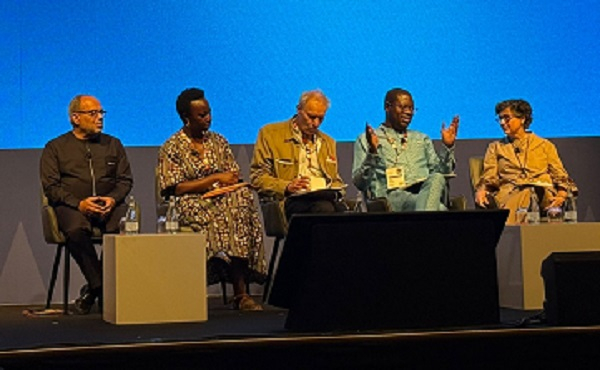The future of Africa in an era of rising transatlantic tensions took centre stage at a spirited debate during the Mo Ibrahim Governance Weekend, hosted by The Africa Report, in Marrakesh on Saturday, May 31, 2025.
The motion before the house was: “The West is breaking up, and that is more good than bad for Africa.”
Arguing for the motion were Carlos Lopes, former Executive Secretary of the UN Economic Commission for Africa, and BBC journalist Beverly Ochieng.
On the opposing side, Arancha González Laya, former Spanish foreign minister and current Dean of the Paris School of International Affairs, joined Bright Simons, Vice President of IMANI Centre for Policy and Education.
The debate, moderated by veteran journalist Patrick Smith, took place against a backdrop of growing friction between America and Europe, a trend some analysts attribute to resurgent nationalism, divergent geopolitical priorities, and the return of hard-edged competition in global affairs.
Bright Simons opened his argument against the motion by cautioning against romanticising Western disunity.
“For many Africans who view the global system as oppressive and dominated by Western powers, the idea of a Western breakup is emotionally appealing. ‘Division among the oppressors’ seems to imply ‘opportunity for the oppressed’, but that is a simplistic reading,” Simons acknowledged.
Simons, during his submission, urged the audience to scrutinise what is driving the US-Europe split, suggesting it is not a moral rethink, but a power recalibration.
“This breakup isn’t about dismantling an unjust system. It’s about one half of the alliance, mainly the US, deciding it hasn’t been getting enough from the global arrangement and wants more. That doesn’t bode well for Africa,” he lamented.
He also argued that unbridled competition between the US and Europe would likely lead to a “race to the bottom”, with Africa as collateral.
Simons cited historical episodes to argue that Western disunity has often exacerbated African vulnerability rather than alleviating it.
“When the US and Europe have clashed, Africa has often paid the price, whether during the Suez Crisis or the fallout of Nixon’s exit from the Bretton Woods system that contributed to Africa’s debt crisis,” he said.
He also raised concerns that a weakened Western alliance would accelerate hard-power strategies, pointing to France’s Cold War-era military expansion in Africa when it distanced itself from NATO.
“A world where Europe can’t count on US military power or moderate it through soft power will see Europe doubling down on its own hard-power game, often at Africa’s expense.”
The policy analyst further warned that Africa is ill-prepared to navigate a fragmented world order dominated by zero-sum geopolitical rivalries and mercantilist standards-setting in areas like AI, biotech, and space governance.
“Even if Africa started mobilising today to join the techno-imperial race, it would take more than a decade to gain meaningful leverage. Meanwhile, a more united West, for all its flaws, at least slows things down and leaves room for African engagement,” Bright Simons argued.
Simons pointed out that current Western-led efforts, however flawed, remain Africa’s only avenue for recovering stolen assets and fighting illicit financial flows.
“The World Bank–UNODC asset recovery framework and initiatives like the Camden Network are Western-driven. BRICS and emerging powers have no real interest in tackling capital flight from Africa. We must not make the perfect the enemy of the good.”
On the other side, Carlos Lopes welcomed the erosion of Western unity as a catalyst for multipolar engagement.
“A divided West opens space for Africa to play new partners against old ones, to renegotiate the global bargain. Africa doesn’t need to be caught in a binary anymore,” Lopes argued.
Beverly Ochieng echoed similar sentiments, calling for greater African agency in global affairs. “We’ve been told for too long that stability means accepting injustice. Maybe instability is the price of equity,” she said.
Meanwhile, a live audience poll taken before the debate showed strong support for the motion, reflecting public sentiment that any fracture in Western hegemony could benefit Africa.
Watch the video below:
BAI/MA
You can also catch the latest news in Twi on GhanaWeb TV below:
